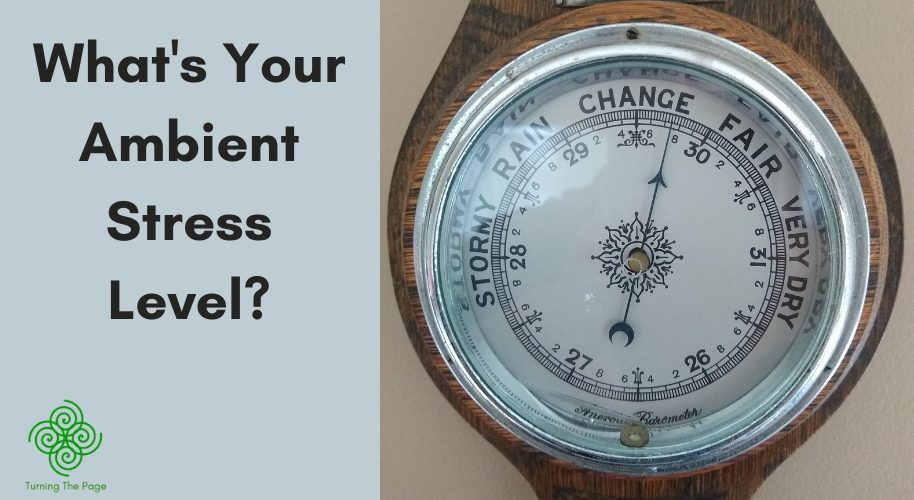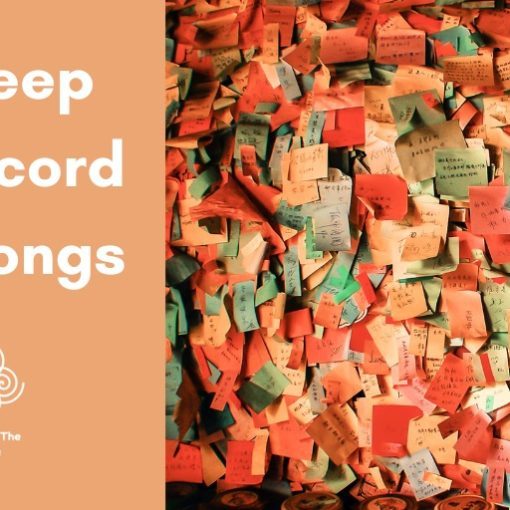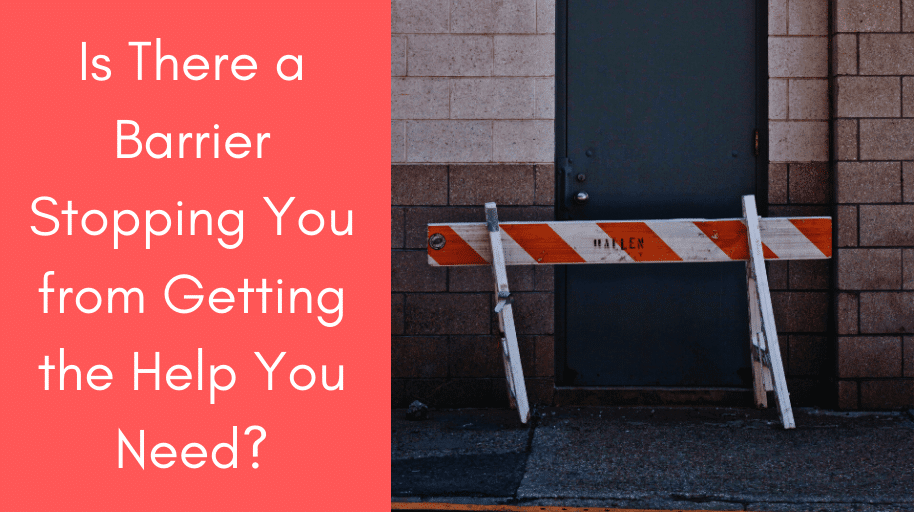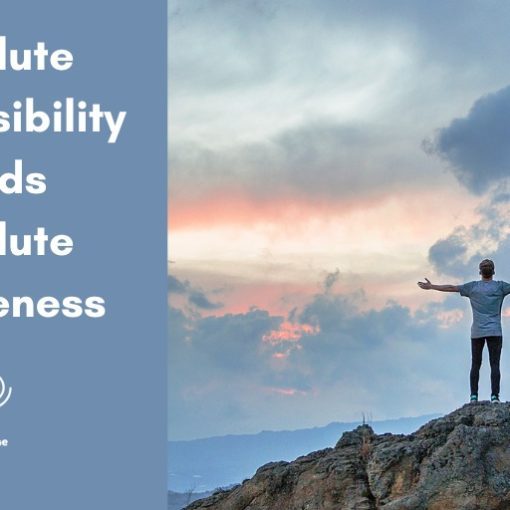It surrounds us all the time. Ambient stress. We probably aren’t even aware of it, but we can do something about it when we recognize it.
I have one of my favorite and most cherished items on the wall above my desk. It is a barometer that measures the pressure of the environment around me. To be more precise, it measures air pressure.
I cherish it because it was originally my father’s. So on this old beauty is a little plaque that has these words.
Presented to MR B PEARMAN from Glenbrook Sunday School Pupils & Teachers. 1949
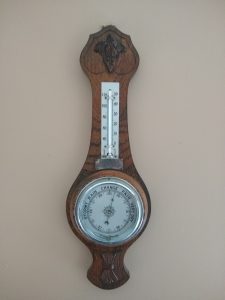
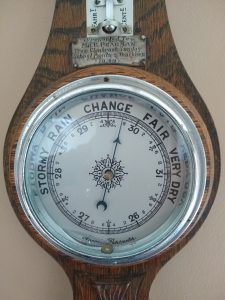
It also has a thermometer to measure the temperature.
I remember my Dad often looking at the barometer to see what was happening in the weather world around him. The little needle would move as the weather and air pressure changed.
A little move to the right would mean the weather would get drier and less likely to rain. A move to the left would show possible rain and storms. All very important to know when you want to decide on whether to shear the sheep or cut the hay crop or not.
There is pressure bearing down on us all the time. Air pressure, but we have become so used to it, and the pressure changes are so subtle that we hardly notice it all. With the barometer, first invented in 1643, we know something about the ambient pressure pushing against us.
Ambient Stress
The word ‘Ambient’ refers to that which is around us. The environment that surrounds us.
When you enter a building, the air conditioning will be set at a specific temperature.
Therefore, the environment will feel a certain temperature because the air conditioning has been set to provide a particular temperature.
Step outside of the building, and you notice a difference. It will combine many factors—temperature, humidity, air pressure, etc.
I once traveled to Colorado Springs. Its height above sea level meant a lower amount of oxygen in the environment.
But the locals were quite used to it. They had adjusted to it. It was their ‘normal.’
We also carry a certain ‘Ambient Stress load.’
It’s a weight. It presses on us.
That pressure will compose many things.
Here are some examples.
- Bills
- Work
- Work relationships
- Your health
- The health of people you care about
- Children
- Exams
- Money
- Traffic
- Obligations
- Memories
- Trauma
- Hurts
- Unforgiveness
- Spouse not seeing things your way
- A thousand other things.
I always include unresolved issues from our past – the hurts and traumas from which we have not found healing. Often these are subconscious. We are not even aware of them.
These add up to weigh down on the barometer of your heart and mind.
Sometimes, this weight becomes so much that you begin to become unwell. We lose sleep.
We might have migraines or stomach ulcers. The body can only take so much.
For some, it might mean mental unwellness, while for others, it might be high blood pressure.
Depression.
For me, it was depression.
I didn’t know what I didn’t know. I thought I was fine, but others started to notice that I was going downhill. But the dark cloud around me seemed so normal, so I carried on.
Then I had one too many stressors on me, and I became seriously unwell.
The final straw broke the camel’s back of my brain.
I became seriously unwell and needed more help than what I could find in myself. I needed others to care for and support me. So I started taking medication and getting counsel.
Slowly, I began to dig myself out of my hole.
I’m still digging, rebuilding like the wall builders of Nehemiah.
This blog and all the other services I offer, such as pastoral coaching and courses, are part of the digging process, and it seems to help others.
It’s a yoke of ambient stress.
In Jesus’ day, they didn’t have the word ‘Stress’ to describe the ambient pressure on them.
But Jesus knew a way of describing the load people were under.
‘Come to me, all you that are weary and are carrying heavy burdens, and I will give you rest.
Take my yoke upon you, and learn from me; for I am gentle and humble in heart, and you will find rest for your souls.
For my yoke is easy, and my burden is light.’ Matthew 11:28 -30
Jesus went straight to a word picture that everyone in his day would have understood.
The yoke was a large wooden or leather collar placed around the neck of an animal such as an ox, horse, or donkey.
To this yoke would have been attached ropes or wooden poles attached to something to be pulled. It might be a cart, a plough, or other agricultural tools.
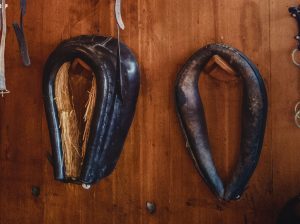
There was a transfer of power or energy from the animal to pulling this weight. It was a burden to carry and pull.
The best yokes were those that considered the shape of the animal it was placed on. Crafted and formed to fit the individual animal’s shoulders so no chaffing or rubbing would happen.
What’s your yoke?
Can you describe your yoke? What are the pressures bearing down on you?
In the version of the Bible called The Message, Matthew 11:28-30 has been paraphrased this way.
“Are you tired? Worn out? Burned out on religion? Come to me.
Get away with me and you’ll recover your life. I’ll show you how to take a real rest.
Walk with me and work with me—watch how I do it. Learn the unforced rhythms of grace.
I won’t lay anything heavy or ill-fitting on you. Keep company with me and you’ll learn to live freely and lightly.”
What is heavy or ill-fitting for you?
Are there relationship stressors? What about stress at work or maybe someone you love is unwell? Does that messy bedroom add weight to your life whenever you walk into the room?
Little things become straws that your camel’s back brain is weighed down under.
I wonder if Jesus would help you identify things in your life that need to be let go of?
Maybe Jesus might encourage you to do more of certain things, like sleep and rest.
That’s what I find as I walk with the Christ. My yoke is continually being crafted and shaped for lightness and strength. Jesus was a carpenter’s son. I wonder if Joseph was ever asked to make a yoke for one of his neighbor’s oxen.
Taking a cup
A simple little reflective exercise that can help you notice the stressors bearing down on you is one of taking a cup.
- Get a journal or a notebook
- Hold a simple cup in your hand
- See this cup as being your life – the container of all that you are
- For the day, write down what has filled your cup. Those things that have given you a sense of life.
- For the day, write down what has drained your cup. Those things that have drained your life.
- Note that some things can both fill and drain
- Do this each day for a week
- Look for patterns
Find out more by reading this post. The Cup. Paying Attention To What Fills and Drains
When we discover those fillers and drainers, we can shape our yoke to fit better.
Quotes to consider
- Stress is directly related to fear. Is anxiety accumulating in your life? The Comforter is always near, but first, you must adopt His perspective. David Riddell
- When stress levels rise, do four things. Relax. Breathe deeply. Tell yourself the truth. Face your secret fear. David Riddell
- Much of the time, we rev up and race about because of unnecessary internal pressures (like unrealistic standards for ourselves) or because external forces are trying to hurry us along for their own purposes (not because of our own needs). Rick Hanson
- The antidote to stress, depression, anxiety, despair is to be on then off, work play, inhale exhale, summer winter. Rhythm is built into creation, and the problem with the modern world is that you can get tomatoes at 2 am Rob Bell
- What I fear most about stress is not that it kills but that it prevents one from savouring life. Jean-Louis Seven-Schreiber
Questions to answer
- What are some of the stressors that you are carrying or yoked to?
- Complete the Cup fillers and drainers exercise. What did you notice? Were they some patterns showing up?
- Some stressors are obvious, while others are subtle and slowly grow around us without us even realising. Can you think of examples of some subtle stressors?
Further reading
Barry Pearman

